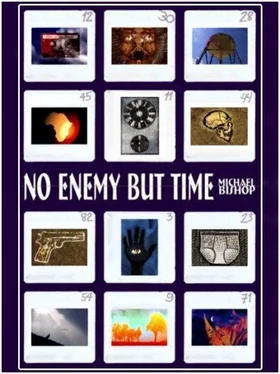Because they would not let me shoot Genly, he would have to modulate by painful degrees toward his inevitable dying. That process was not one I was going to be able to watch.
“Listen, Helen—”
When she jostled my hand again, I stood up, removed the clip from my pistol, scattered cartridges right and left, and held the weapon before me like a defanged cobra, a creature no less hateful for having been rendered harmless. The night was chilly, probably no more than fifty-five degrees Fahrenheit; and, half-naked to the stars, I was a candidate for either pneumonia or hypothermia. I wanted a good warm, woolen blanket and a bottle of whiskey or ouzo. My tears were streaming, and I tried to staunch them with my forearms and the back of my wrist.
Goddamn rod, I thought. You’ve turned poor Genly into his own assassin. You’ve made me an accomplice….
I stumbled away from the dying habiline and the two Minid women. The other members of the band, wearing expressions of imbecilic incomprehension, reeled back to let me by, and I began circling a small section of the hilltop, winding my body about itself the way a discus thrower does. At last I caught myself up and hurled my pistol out over the savannah toward Mount Tharaka. It spun away into the night like a stone from a catapult. I was rid of it. This knowledge frightened as well as relieved me. For the sake of a quixotic scruple I had set my entire life at risk. Did Genly, or anyone else, give a damn…?
* * *
Genly was a hardy soul. Although he finally fell unconscious, he took all night to die. Considering the nature of his wound, my first-aid kit (a grab bag of bandages, painkillers, and placebos) was powerless to aid or ease him, and I made no second attempt to intervene. Afraid to go too far afield as well as to remain too close at hand, I spent that night hiking up and down the hillside and along its serpentine parapets of stone. At dawn I returned and found only Emily still keeping vigil.
By this time Genly had begun to resemble the mummy that death would make of him. His skin was taut on his bones, his hair brittle and lackluster. When he died, Emily, who knew, made a blood-clabbering keening sound, her head thrown back and her cry half the howl of a canid and half the desperate threnody of a human being. All the Minids came out to listen, and to watch, and to feel the fingers of mutability grapple at the mortal handles of their hearts. One of their own was dead.
Ceremony?
Yes, there was ceremony. To have witnessed it, Alistair Patrick Blair would have given up his post in President Tharaka’s cabinet. To have prevented its cause, I would have foregone the chance to give flesh to my dreams. These were sacrifices that neither Blair nor I had the option of making, however, and the ceremony commemorating Genly’s passage from death to some uncertain transcorporal realm took place in my presence rather than the paleontologist’s.
First, the Minids knew that they must remove the corpse from their city. If they did not, the smell of decomposition would summon vultures, hyenas, and other carrion eaters. Second, the habilines remembered Genly as he had once been. In mourning the rigid, unblinking state into which he had lapsed they also mourned their own mortality. Conscious, or preconscious, our protohuman ancestors suffered an acute tristesse that could only have derived from an intuition of the inevitability of death: “One day Genly’s fate will be mine. What does this mean?”
Not long after sunrise, the women spread out across the steppe and gathered the wild sisal called ol duvai by the Maasai of Kenya and Tanzania as well as by their Sambusai cousins in Zarakal. Later the women anointed Genly’s body with the juices of this plant, a natural antiseptic and painkiller. They covered him from head to foot and canted his corpse onto its side in order to reach every part of him.
Wherefore medicine for a dead man? Did they wish to spare him the unknown agonies awaiting the newly dead deeper in the domain of nonexistence?
But the females had played out their role. Genly’s body hair was gummy with sisal juice, his brow a piece of parchment spread with mucilage. Now the males moved in, and I with them. Fortunately no one sought to prohibit or discourage my involvement. As the youngest hunters, Roosevelt and Fred bore the brunt of transporting Genly’s corpse down the hillside to the savannah, but the rest of us helped when the going got particularly treacherous. Beneath New Helensburgh the Minids rested briefly, girding themselves for a trek to the southeast—in the direction of Mount Tharaka, the throne of their world.
The travois on which we had brought the warthog back to our citadel lay at the base of the hill. I signaled to the habilines that, if we still had a good distance to go, Genly should be laid upon the travois.
After debating this matter with glances and subtle eye narrowings, the Minids agreed to my suggestion. I insisted on gripping the forward poles of the sledge and dragging my dead friend’s body to wherever his compatriots wished it to go. Again no one gainsaid me. The other Minids, carrying staves or clubs, acted as outriders, and for approximately three miles we trudged in disorderly procession across the grasslands to a solitary baobab.
Here, to my surprise, Alfie, Malcolm, Roosevelt, and Fred struggled to install the corpse in the tree, as high among the great rootlike branches as they could lodge it without risking their own lives. Exempt from this labor by virtue of age, past service, or (in my case) fatigue, Jomo, Ham, and I looked on. We made ourselves useful by surveying the surrounding countryside for enemies, predatory gatecrashers. At last poor Genly sat slumped in a niche of baobab boughs, and the other Minids, sticky with sisal balm, cascaded to the ground one after another to offer their heartfelt obeisance to the corpse. I expected singing, but there was none until all the Minids except Ham had retreated to a patch of bush nearly a hundred yards from the tree. I withdrew with the majority, but I kept thinking that if a lion or a sabertooth or even a pack of wild dogs caught Ham out there alone, he would soon join Genly in the problematical Never-Never Land of Habiline Heaven.
Then Ham began to sing. His tired old throat gave out a rasping keen that went on and on, focusing the implicit meaning of the entire veldt on the baobab beneath which he stood. I shuddered to hear his song, shuddered to think that I might actually understand the immemorial impulse giving rise to such homage.
Then Ham stopped singing and came sauntering toward us on his bandy legs, a naked, defenseless gnome paradoxically dwindling in stature the farther behind him he left the baobab—as if the reality of his person paled before the ideal embodied in his lofty, sour song.
I then expected the Minids to set out for New Helensburgh, to take back to their women confirmation of Genly’s tree burial. From dust to dust, from treetop to treetop. But even as the day drew on past noon, we remained in our blind of scrub plants and gall acacias. To stop the throbbing in my temples, I sat down and hung my head between my knees. Roosevelt and Fred paced back and forth in the undergrowth, heedless of the heat, impatient for a break in our vigil. Excitedly they signaled this break themselves by hooting softly and crowding forward to the edge of the thicket.
Beneath the baobab there had appeared a leopard, a long, handsome animal with caved-in flanks and sapphire-bright eyes. Although primarily a nocturnal hunter, this leopard—respectfully contemptuous of the dangers posed by the afternoon activity of its cousins, the lions—was answering Ham’s midday summons. It glanced about the landscape, gave a tentative growl, then flowed up the trunk of the baobab with the grace of a python. Here it took possession of Genly with its teeth.
Читать дальше



![Ally Carter - [Gallagher Girls 01] I'd Tell You I Love You But Then I'd Have to Kill You](/books/262179/ally-carter-gallagher-girls-01-i-d-tell-you-i-lo-thumb.webp)








